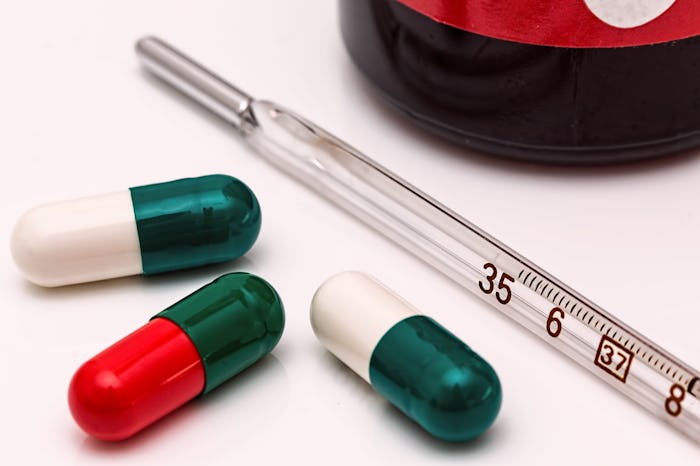Life

How Much Benadryl Is Safe For Kids? Children Have Died From Overdoses
Any discussion of medication use in children can be fraught with uncertainty, worry, and plenty of differences in opinion. Some parents opt to eschew medicating their children pretty much entirely, sometimes preferring homeopathic or "natural" remedies for things like colds, fever, or nausea. Other parents feel OK giving their children medication like Benadryl for allergies, or Tylenol for fever, and — thanks to the drowsiness factor — some also use it for off-label uses, like helping a sick or overtired child sleep, or to help their child sleep during long flights. Expert opinions can vary, but if you are going to give your children medication for any reason (including alternative remedies), one thing is clear: dosage matters. How much Benadryl is safe for kids? Even small overdoses can lead to death.
According to NBC News, the Associated Press reported that a 4-month-old baby boy died earlier this year after it was discovered that he was allegedly given an overdose of Benadryl by his day care provider. While the cause of the child's death was initially deemed to be Sudden Infant Death Syndrome (SIDS), further investigation found that he had actually died from "acute diphenhydramine intoxication," according to local newspaper The Fairfield Citizen. Charges have not yet been brought in the case, and, according to Fairfield Deputy Police Chief Chris Lyddy, it's still unclear whether the overdose was accidental or intentional. But even if it were found to be an accident, Lyddy told the paper that "certainly, negligence would be a factor in administering a lethal dose of anything to an infant."
There's no doubt about that, and 4 months certainly seems entirely too young an age to receive caregiver-administered Benadryl. But unfortunately, there doesn't exactly appear to be a consensus on how old a child should be to be given the medication safely. The St. Louis Children's Hospital's website, for example, says Benadryl shouldn't be administered to children under 12 months for the purpose of treating allergies, and offers dosing information for children weighing 20 pounds and up). The hospital also advises against giving Benadryl to a child for a cold (or, presumably, for any other reason) at any age. A website for a pediatric group in New York City (which comes up pretty high in a cursory Google search of dosage information), says Benadryl can be given to infants 6 months or older, with a minimum weight of 11 pounds. According to Arkansas pediatric clinic All For Kids, parents should consult a doctor before administering Benadryl to children weighing less than 18 pounds, and the Benadryl website itself indicates that the product should not be given to children under 2 years old. Bottom line: the best course of action when giving medication to young children is to consult your doctor first.
As for using Benadryl for sedation purposes (like when traveling), experts also differ in opinion. Infant sleep expert Dr. Harvey Karp, M.D. told ABC News he recommends using small amounts of Benadryl when taking children on an airplane, but warns it's also possible for the drug to have the opposite effect on kids, making them hyper instead of drowsy (ack!). Dr. Blair Hammond, M.D., a pediatrician at Mt. Sinai Hospital was a little less enthusiastic about the idea though, and told ABC News that, "it is not recommended to give your children anything before they fly," although Benadryl is "technically safe" to give to children older than 6 months if parents choose to use it. On the other hand, Dr. Wendy Sue Swanson, M.D. of Seattle Children's Hospital writes on her blog, Seattle Mama Doc, that "using a medication for your convenience is never an indication for medication in a child, and argues that "the response to Benadryl is inconsistent between kids and can be dangerous."
Swanson continued,
Children can get dry mouth, stomachache, nausea, vomiting or rarely an allergic response to the med, heart palpitations, rash or other neurologic changes. And, some kids go absolutely nutty...The last place you want to be with an unexpected or undesirable medication side effect is on the airplane at 35,000 feet
Again, consulting with your child's doctor is always the best when it comes to your specific situation, but if you do give your child medication (either Benadryl, or anything else), it's important to pay close attention to how much you are giving. Dosage amounts should be determined based on weight, not just age, and according to the St. Louis Children's Hospital, regular spoons should not be used to give children medication, as they are not reliable for measuring purposes:
Syringes and droppers are more accurate than teaspoons. If possible, use the syringe or dropper that comes with the medicine. If not, you can get a med syringe at drug stores. If you use a teaspoon, it should be a measuring spoon...Keep in mind 1 level teaspoon equals 5 mL and that ½ teaspoon equals 2.5 mL.
Parents and caregivers should keep a close watch on children receiving a medication for the first time, and should contact their doctor or head to the nearest emergency department in the case of complications or side effects.